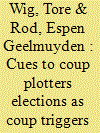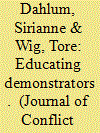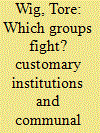|
|
|
Sort Order |
|
|
|
Items / Page
|
|
|
|
|
|
|
| Srl | Item |
| 1 |
ID:
152230


|
|
|
|
|
| Summary/Abstract |
Do elections reduce or increase the risk of autocratic regime breakdown? This article addresses this contested question by distinguishing between election events and the institution of elections. The authors propose that elections stabilize autocracies in the long term but at the price of short-term instability. Elections are conducive to regime survival in the long run because they improve capacities for co-optation and repression but produce short-term instability because they serve as focal points for regime opposition. Drawing on data from 259 autocracies from 1946 to 2008, the authors show that elections increase the short-term probability of regime failure. The estimated effect is retained when accounting for the endogeneity of autocratic elections; this finding is critical, since some autocrats may or may not hold elections because of perceived effects on regime survival. The authors also find that this destabilizing effect does not operate in the long term. They find some, although not as strong, evidence that elections stabilize autocratic regimes in the medium to long term, despite their destabilizing immediate effects. These temporal effect patterns are present for both executive and legislative elections, and they are robust to using different measures, control variable strategies, and estimation techniques. In line with expectations, both effect patterns are much clearer for multiparty autocratic elections than for completely uncontested elections.
|
|
|
|
|
|
|
|
|
|
|
|
|
|
|
|
| 2 |
ID:
147312


|
|
|
|
|
| Summary/Abstract |
A large proportion of coup attempts in autocracies occur in the aftermath of elections, yet little systematic research exists on the topic. Drawing on recent literature on elections in autocracies, we present an argument to explain postelection coups. While we recognize that electoral institutions have the potential to stabilize autocracies, we illustrate that the election event can spark instability when incumbents reveal electoral weakness. Electoral outcomes—in the form of vote shares and opposition reactions—are signals containing information about the strength of the opposition, and indirectly about the likelihood of a successful full-scale revolution that would compromise the privileged positions of regime elites. In these situations, coups are likely to be initiated to avoid a revolution, either by serving as concessions to the opposition or by facilitating increased repression. We perform a large-N study that supports our argument, significantly nuancing the claim that elections stabilize autocracies.
|
|
|
|
|
|
|
|
|
|
|
|
|
|
|
|
| 3 |
ID:
163431


|
|
|
|
|
| Summary/Abstract |
Does a more educated population spur regime-challenging mass protest? It is commonly argued that educated individuals are more likely to collectively challenge governments through protests and that this may explain why education is associated with democratization. While many studies have investigated education’s effect on conventional political participation (voting, petitioning, etc.), it is not known whether education levels affect contentious mass protest. This article argues that education increases the frequency of mass protest, by alleviating collective-action problems and motivating mass opposition, particularly in autocracies. These links are investigated at the subnational level in Africa, by mapping over 600,000 survey respondents to spatialized protest-event data. We present evidence that areas with more educated populations have higher levels of protest activity, and we find mixed evidence consistent with both opportunity- and grievance-related mechanisms driving this relationship. We proceed to identify the causal effect of education by using the location of colonial-era Christian missions to instrument for local education levels.
|
|
|
|
|
|
|
|
|
|
|
|
|
|
|
|
| 4 |
ID:
166004


|
|
|
|
|
| Summary/Abstract |
The Historical Varieties of Democracy dataset (Historical V-Dem) contains about 260 indicators, both factual and evaluative, describing various aspects of political regimes and state institutions. The dataset covers 91 polities globally – including most large, sovereign states, as well as some semi-sovereign entities and large colonies – from 1789 to 1920 for many cases. The majority of the indicators come from the Varieties of Democracy dataset, which covers 1900 to the present – together these two datasets cover the bulk of ‘modern history’. Historical V-Dem also includes several new indicators, covering features that are pertinent for 19th-century polities. We describe the data, coding process, and different strategies employed in Historical V-Dem to cope with issues of reliability and validity and ensure intertemporal and cross-country comparability. To illustrate the potential uses of the dataset we describe patterns of democratization in the ‘long 19th century’. Finally, we investigate how interstate war relates to subsequent democratization.
|
|
|
|
|
|
|
|
|
|
|
|
|
|
|
|
| 5 |
ID:
146923


|
|
|
|
|
| Summary/Abstract |
Research on the relationship between political institutions and civil war has paid insufficient attention to the role of traditional institutions in developing countries. This study presents large-N evidence showing that traditional ethnic institutions with origins prior to Western colonization are associated with the prevalence of civil wars in Africa after independence. Matching ethnographic data on the pre-colonial political organization of African indigenous groups to contemporary data on ethnic groups in conflict, I investigate the relationship between the traditional organization of ethnic groups and ethnic civil wars in Africa after decolonization. Specifically, I argue that excluded groups with centralized traditional institutions can rely on these institutions to more credibly bargain with the state, and that this reduces their risk of conflict. Accordingly, I find that excluded groups with centralized pre-colonial institutions are less likely to be involved in civil wars.
|
|
|
|
|
|
|
|
|
|
|
|
|
|
|
|
| 6 |
ID:
160530


|
|
|
|
|
| Summary/Abstract |
Why are some ethnic groups embroiled in communal conflicts while others are comparably peaceful? We explore the group-specific correlates of communal conflicts in Africa by utilizing a novel dataset combining ethnographic information on group characteristics with conflict data. Specifically, we investigate whether features of the customary political institutions of ethnic groups matter for their communal-conflict involvement. We show how institutional explanations for conflict, developed to explain state-based wars, can be successfully applied to the customary institutions of ethnic groups. We argue that customary institutions can pacify through facilitating credible nonviolent bargaining. Studying 143 ethnic groups, we provide large-N evidence for such an ‘ethnic civil peace’, showing that groups with a higher number of formalized customary institutions, like houses of chiefs, courts and legislatures, are less prone to communal conflict, both internally and with other groups. We also find some evidence, although slightly weaker, that groups with more inclusive or ‘democratic’ customary institutions are less prone to communal conflicts.
|
|
|
|
|
|
|
|
|
|
|
|
|
|
|
|
|
|
|
|
|